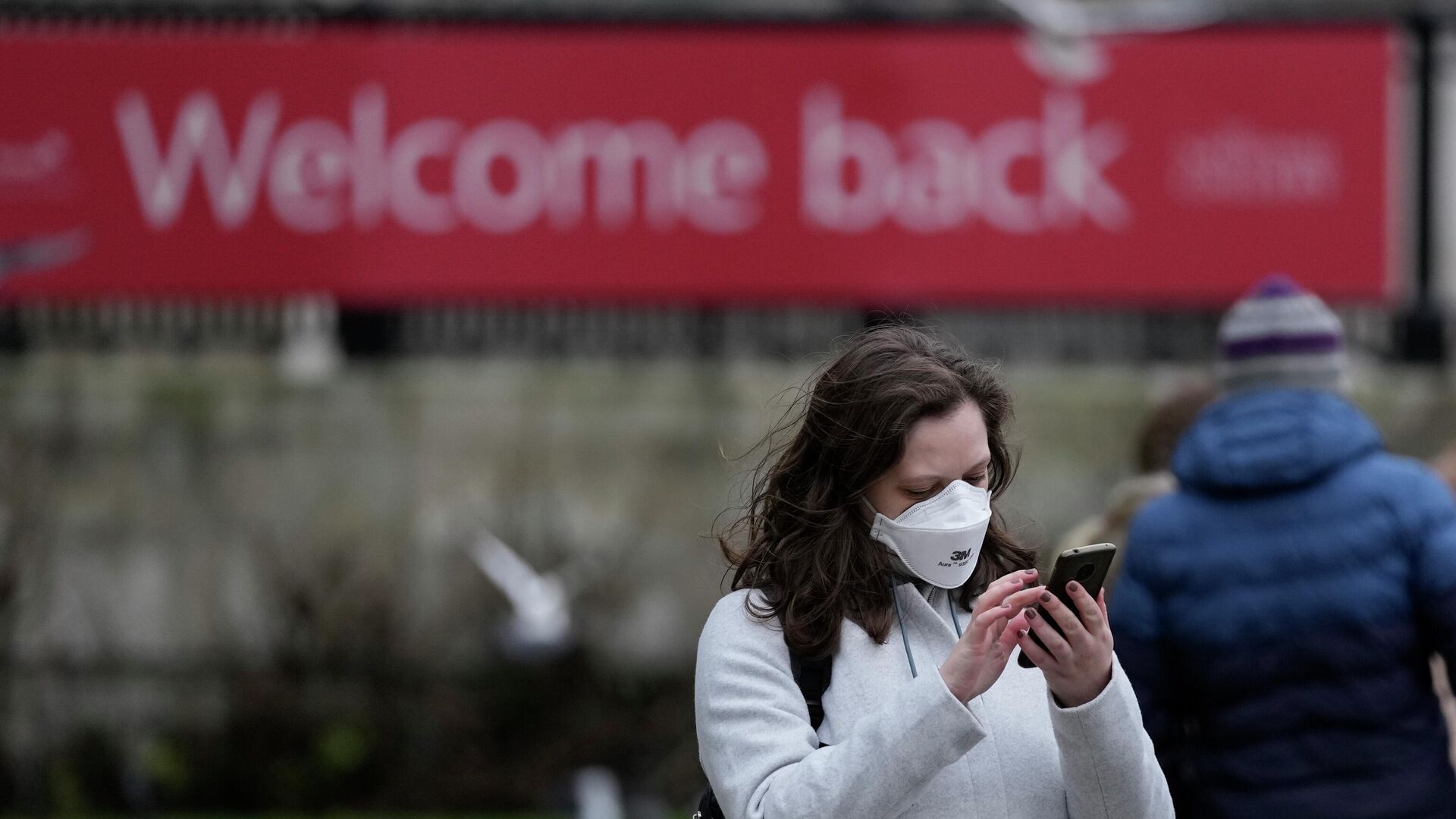https://sputnikglobe.com/20220112/victory-over-covid-eus-top-medical-body-says-omicron-pushing-pandemic-toward-endemic-1092205249.html
Victory Over Covid? EU’s Top Medical Body Says Omicron Pushing Pandemic Toward Endemic
Victory Over Covid? EU’s Top Medical Body Says Omicron Pushing Pandemic Toward Endemic
Sputnik International
Medical authorities around the world have geared up to tackle Omicron, the SARS-CoV-2 variant which has caused a dramatic spike in infections in many... 12.01.2022, Sputnik International
2022-01-12T13:12+0000
2022-01-12T13:12+0000
2022-01-12T16:27+0000
omicron covid strain
european medicines agency
coronavirus
omicron strain
https://cdn1.img.sputnikglobe.com/img/07e6/01/0c/1092210207_0:160:3072:1888_1920x0_80_0_0_30355b20755169b83889c06b8dc36aed.jpg
Omicron may be pushing the coronavirus pandemic toward an endemic status, Marco Cavaleri, the chief of vaccine strategy at the European Medicines Agency, has said.In epidemiology, an endemic is a state at which enough of the population has gained immunity to a virus, either from infection or vaccination, to cause a major drop in transmission, hospitalization, and death, leading to a lessening or even the end of the medical emergency.“Omicron apparently presents some differences in the way it infects cells after binding to the ACE2 receptor, which could lead to a reduced spread of the disease into the lungs. On the other hand, Omicron is highly contagious, resulting in high numbers of infected individuals, so it is very important to be aware of its potential burden and not to dismiss it as a mild disease,” the official emphasized.Cavaleri noted that the preliminary results of studies on existing vaccines’ effectiveness against the variant is “significantly reduced” compared to previous strains. “The studies suggest that more vaccinated people will develop breakthrough infection and disease resulting from Omicron due to the immunevasion associated with this variant,” he said, using another word for ‘viral antigenic escape’, which can be caused by so-called ‘leaky vaccines’.The EMA official further indicated that despite being less effective in preventing infection, the evidence which has emerged from South Africa, the UK and other countries suggests that vaccines do decrease the risk of hospitalization with Omicron.Commenting on proposals to create a separate adapted vaccine designed specifically to tackle the variant, Cavaleri stressed that it needed to be taken into account that “by the time any vaccine adapted to Omicron is developed, it is possible that the epidemiological picture in the EU will have significantly evolved in terms of circulating variants and natural exposure to Omicron.”BoostersCavaleri expressed doubts about proposals to reduce the amount of time between Covid vaccine ‘boosters’ for the general public, warning that this could lead to problems, including issues with immune response.“While use of additional boosters can be part of contingency plans, repeated vaccinations within short intervals would not represent a sustainable long-term strategy,” he said.Europe, the United States and other regions across the planet have witnessed a surge in Covid cases in recent weeks, with much of the spike blamed on Omicron. On Tuesday, World Health Organization regional director for Europe Hans Kluge indicated that over half of the population of Europe could be infected with Omicron in the next 6-8 weeks due to its high transmissibility, with the variant already becoming dominant in Western Europe and spreading to the Balkans.Last month, a study out of South Africa offered hopeful news on Omicron, suggesting that being infected with the more mild strain – whose symptoms typically include headache, runny nose, fatigue and sore throat, can reduce the chances of getting infected with the potentially more dangerous Delta – which can attack the lungs, and provide cross-strain immunity.
https://sputnikglobe.com/20220108/omicron-is-ray-of-light-for-end-of-covid-19-pandemic-uk-expert-says-1092114656.html
https://sputnikglobe.com/20201224/coronavirus-billionaires-us-media-lists-50-new-medical-industry-moguls-who-got-rich-off-pandemic-1081559320.html
https://sputnikglobe.com/20220111/who-over-half-of-european-population-to-get-infected-with-omicron-in-next-6-8-weeks-1092178983.html
Sputnik International
feedback@sputniknews.com
+74956456601
MIA „Rossiya Segodnya“
2022
News
en_EN
Sputnik International
feedback@sputniknews.com
+74956456601
MIA „Rossiya Segodnya“
Sputnik International
feedback@sputniknews.com
+74956456601
MIA „Rossiya Segodnya“
european medicines agency, coronavirus, omicron strain
european medicines agency, coronavirus, omicron strain
Victory Over Covid? EU’s Top Medical Body Says Omicron Pushing Pandemic Toward Endemic
13:12 GMT 12.01.2022 (Updated: 16:27 GMT 12.01.2022) Medical authorities around the world have geared up to tackle Omicron, the SARS-CoV-2 variant which has caused a dramatic spike in infections in many countries. Epidemiologists say Omicron is highly transmissible, but it is also believed to be milder than its predecessor, Delta, typically presenting as a common cold.
Omicron may be pushing the coronavirus pandemic toward an endemic status, Marco Cavaleri, the chief of vaccine strategy at the European Medicines Agency, has said.
“With the increase of immunity in population – and with Omicron, there will be a lot of natural immunity taking place on top of vaccination – we will be fast moving toward a scenario that will be closer to endemicity,” Cavaleri
said at a press conference on Tuesday.
In epidemiology, an endemic is a state at which enough of the population has gained immunity to a virus, either from infection or vaccination, to cause a major drop in transmission, hospitalization, and death, leading to a lessening or even the end of the medical emergency.
“The highly transmissible Omicron variant was first detected in Europe at the end of last year. It has now spread quickly across our continent. It is fast becoming the dominant variant. It appears Omicron causes less severe disease than the Delta variant. Studies from South Africa, the UK and some European countries are showing that the risk of being hospitalized after infection with Omicron is decreased to approximately half compared to the Delta variant,” Cavaleri noted, while cautioning on the need for further studies.
“Omicron apparently presents some differences in the way it infects cells after binding to the ACE2 receptor, which could lead to a reduced spread of the disease into the lungs. On the other hand, Omicron is highly contagious, resulting in high numbers of infected individuals, so it is very important to be aware of its potential burden and not to dismiss it as a mild disease,” the official emphasized.

8 January 2022, 16:33 GMT
Cavaleri noted that the preliminary results of studies on existing vaccines’ effectiveness against the variant is “significantly reduced” compared to previous strains. “The studies suggest that more vaccinated people will develop breakthrough infection and disease resulting from Omicron due to the immunevasion associated with this variant,” he said, using another word for ‘viral antigenic escape’, which can be caused by so-called ‘leaky vaccines’.
The EMA official further indicated that despite being less effective in preventing infection, the evidence which has emerged from South Africa, the UK and other countries suggests that vaccines do decrease the risk of hospitalization with Omicron.
Commenting on proposals to create a separate adapted vaccine designed specifically to tackle the variant, Cavaleri stressed that it needed to be taken into account that “by the time any vaccine adapted to Omicron is developed, it is possible that the epidemiological picture in the EU will have significantly evolved in terms of circulating variants and natural exposure to Omicron.”

24 December 2020, 11:47 GMT
Cavaleri expressed doubts about proposals to reduce the amount of time between Covid vaccine ‘boosters’ for the general public, warning that this could lead to problems, including issues with immune response.
“If we have a strategy in which we give boosters every four months, we will end up potentially having problems with immune response,” Cavaleri warned. “And secondly of course there is the risk of fatigue in the population with the continuous administration of boosters,” he added.
“While use of additional boosters can be part of contingency plans, repeated vaccinations within short intervals would not represent a sustainable long-term strategy,” he said.
Europe, the United States and other regions across the planet have witnessed a surge in Covid cases in recent weeks, with much of the spike blamed on Omicron. On Tuesday, World Health Organization regional director for Europe Hans Kluge
indicated that over half of the population of Europe could be infected with Omicron in the next 6-8 weeks due to its high transmissibility, with the variant already becoming dominant in Western Europe and spreading to the Balkans.

11 January 2022, 12:24 GMT
Last month, a
study out of South Africa offered hopeful news on Omicron, suggesting that being infected with the more mild strain – whose symptoms typically include headache, runny nose, fatigue and sore throat, can reduce the chances of getting infected with the potentially more dangerous Delta – which can attack the lungs, and provide cross-strain immunity.





